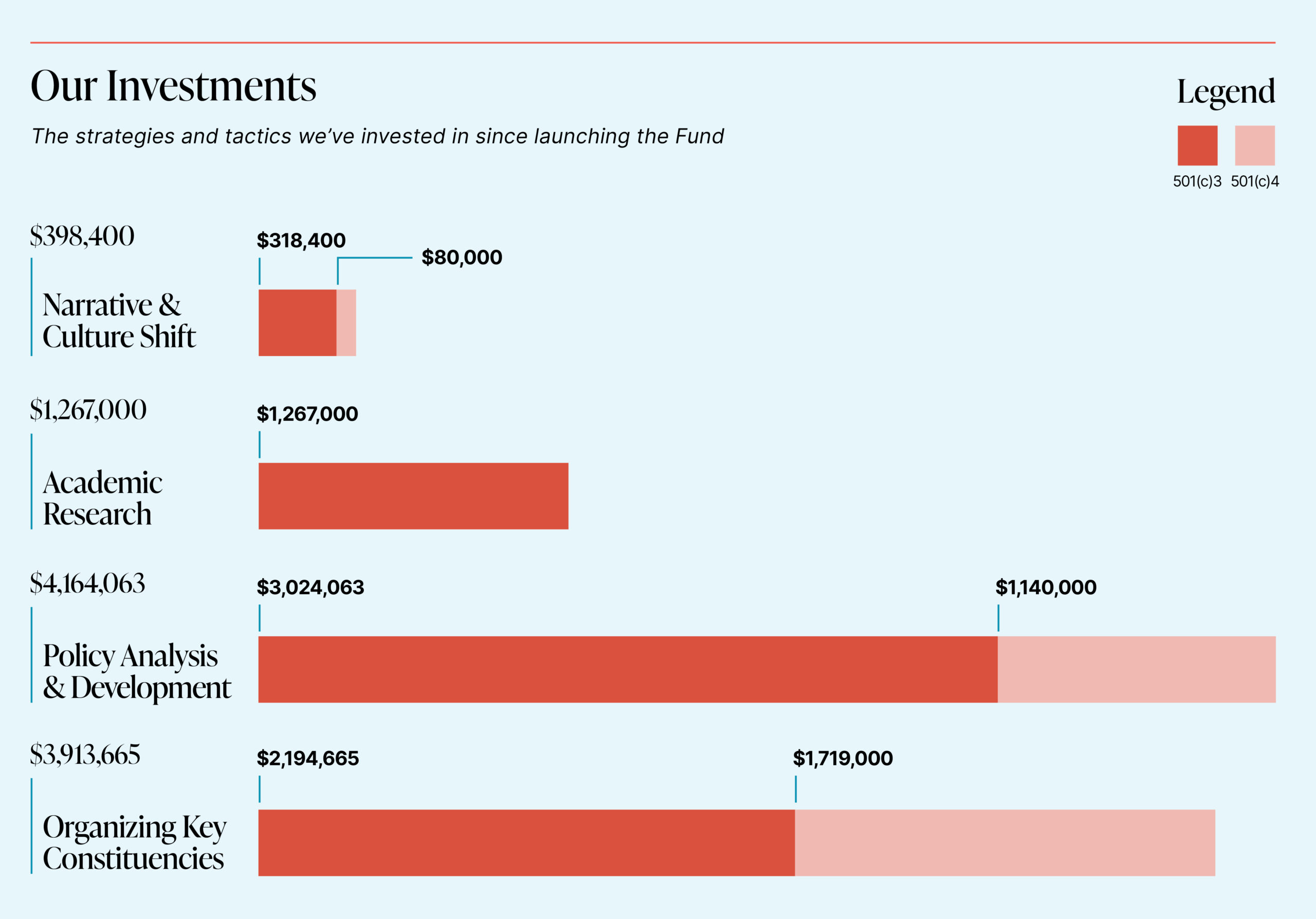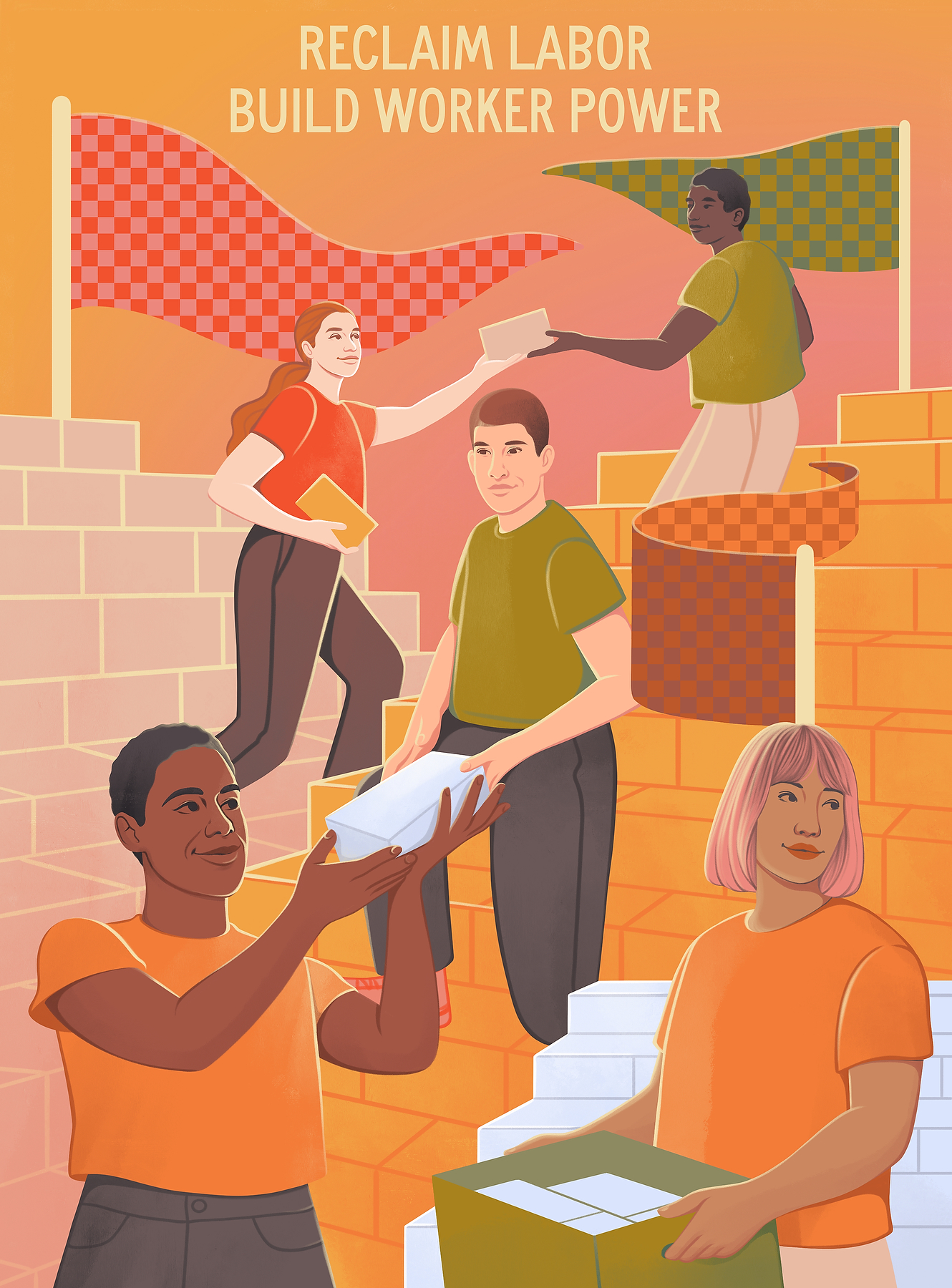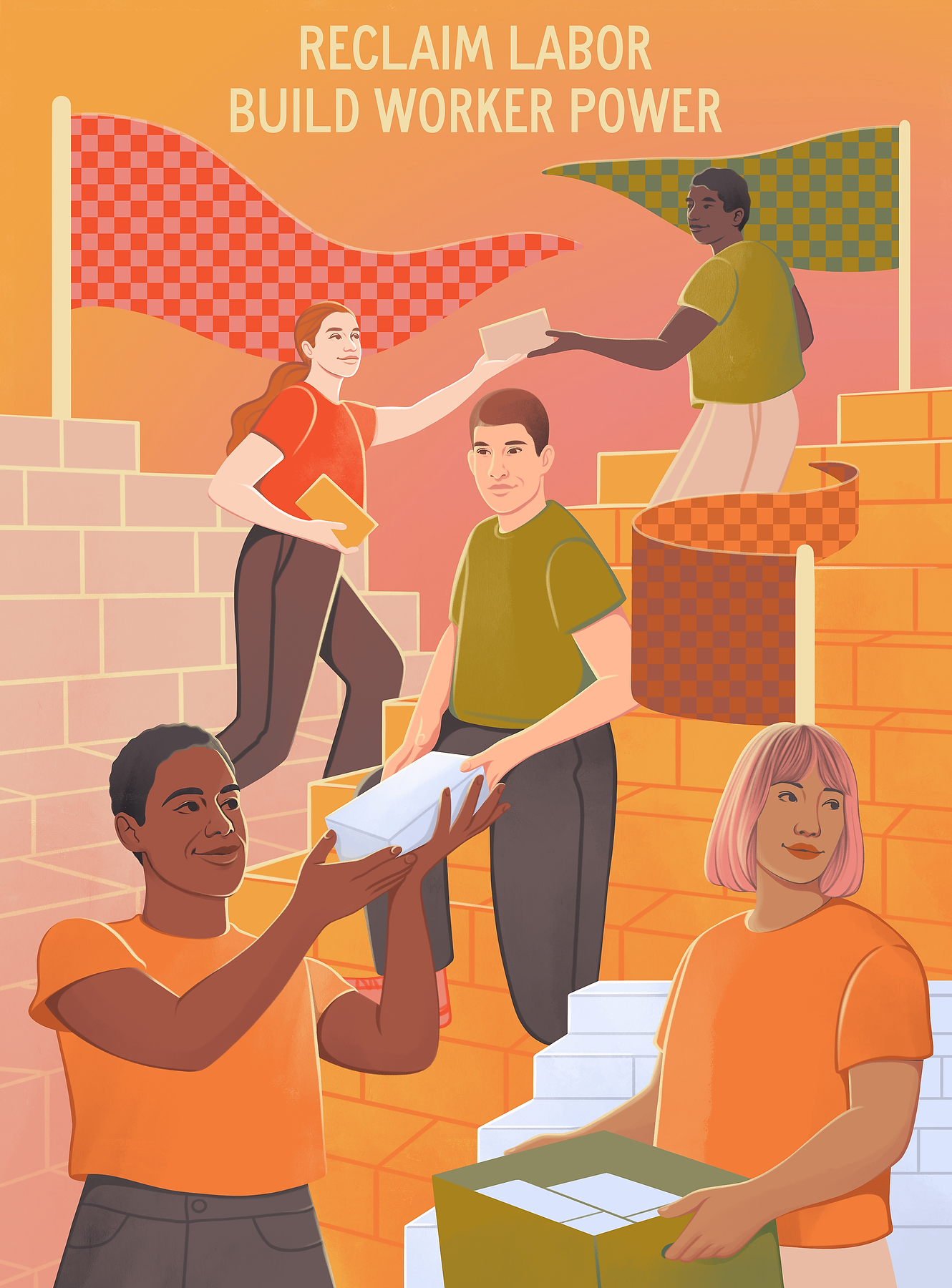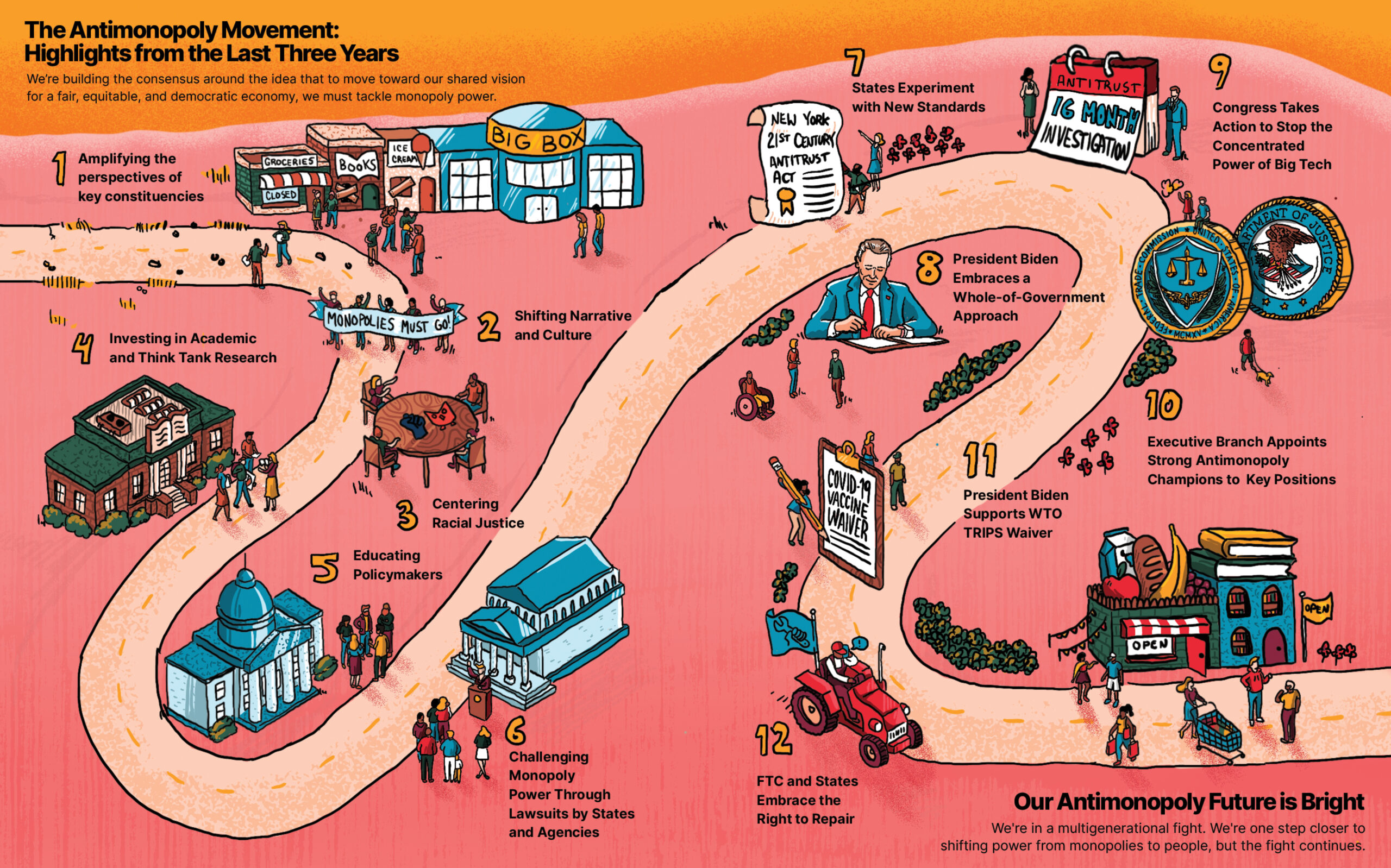Antimonopoly
From Moment to Movement: The Antimonopoly Fund
09. 22. 2022
The Antimonopoly Fund transformed the antimonopoly movement, infusing resources and capacities to unite groups across the field.

Introduction
The signs of a new paradigm that embraces the public’s role in shaping markets that work for us—instead of letting corporations have free reign to exploit and extract from communities, everyday people, and workers—are all around us.
Catalyzing the Antimonopoly Field
From Lina Khan’s confirmation as Chair of the Federal Trade Commission (FTC) to the groundbreaking investigation on the Hill that recognized the perils of Big Tech’s monopoly power, we’ve started to explore the full breadth of antimonopoly tools that can be tapped to rein in monopoly power. It’s progress that most of us could not have imagined three years ago, when it was not yet conventional wisdom to examine our democratic and economic woes through the lens of concentrated economic power.
The Antimonopoly Fund catalyzed the antimonopoly field at a critical time. We injected resources and capacities needed to deliver wins that we didn’t think possible at our formation. We doubled down on engaging key constituencies, like workers, small business leaders, and entrepreneurs who know firsthand the high stakes of the antimonopoly fight. We brought in cutting-edge scholars who are redefining the contours of the antimonopoly field, asking critical questions about how we think about and respond to monopoly power.
We grew the field by supporting racial justice organizers who were once sidelined and dismissed in antimonopoly conversations. We supported a plethora of groups, coalitions, and cohorts working across the economy to tackle monopoly power, including in two key fights: regulating Big Tech and addressing massive vaccine inequity during an ongoing global pandemic.
This momentum is a true testament to what the individuals and organizations leading these fights can accomplish with the right resources. To date, we’ve infused over $11 million into the field, surpassing our initial goal of $10 million. Nearly $10 million of this total consisted of grants and contributions, and 100% of the funds from external donors and foundations went directly to our partners. Throughout this report, you’ll find portraits of just a small handful of the antimonopoly champions we’ve partnered with, included to give you an idea of the diversity of roles and experts in the field working toward a more fair, egalitarian, and democratic vision for our economy. We’ve also learned from these partners how important it is to not just identify the problem, but also to envision the world we are building. You’ll also see throughout this report visual depictions that capture what’s possible if we sustain
the fight.
This report captures our lessons learned from launching and operating the fund. The first section describes the moment that launched the fund and signaled our entry into the antimonopoly field. Next, we describe our approach and what we made possible. Then, we unpack and answer the questions that guided our exploration of this field and informed the shared analysis that we built with other funders:
What strategies and tactics needed support to convince decision-makers to take antimonopoly action?
Whose voices and perspectives could we lift up to underscore and understand the impact of monopoly power on people’s lives?
What were the opportunities in specific sectors to ramp up support, to drive momentum toward a concrete win; or break out into the mainstream?
What policy levers and tools were needed to double down on an antimonopoly approach?
The last few sections of this report commemorate the promising signs of a new paradigm taking shape; describe what it took to get there; share our lessons learned; and articulate a vision for the next phase of our antimonopoly work.
Sustained support for the antimonopoly field will be critical in the months, years, and decades ahead. Despite the gains in the field over the last three years, we are still only on the cusp of locking in a new paradigm and delivering tangible, long-lasting results. There is still plenty to be done. As the monopolists double down on their opposition, leveraging opportunities to build and strategize together to strengthen the antimonopoly movement is more critical than ever. We’re committed to the antimonopoly fight and holding down the field—and the movement needs more resources, champions, and allies to actualize our fair, egalitarian, and democratic vision for the economy.
The MomentThe Moment
When we officially launched the Antimonopoly Fund in October 2019, there was no other organization focused on uniting the antimonopoly movement. We responded to a clear need articulated by newcomers and established vanguards alike.
Why We Launched the Fund
At the time, a discrete set of individual actors and organizations, led by organizations like the Open Markets Institute and emerging cross-issue coalitions like the Athena Coalition, paved the way for growing momentum, even as these groups remained on the fringes of the mainstream. They were sounding the alarm on America’s monopoly problem, highlighting how higher prices, lower quality, fewer choices, and reduced innovation were all the effects of corporate concentration and consolidation that plagued our economy—including our hospitals, internet service providers, and more—but they were often ignored, dismissed, and sidelined. Tackling concentrated power—and considering the different, broader facets of power, to include economic and political power—was too often a non-starter for our institutions and decision-makers.
The movement lacked critical infrastructure, too. Groups needed resources to kick off and execute sharp, agile campaigns educating the public and key decision-makers on the monopoly problem. The capacity was not there to expand teams and bring in a variety of voices and perspectives beyond the lawyers and economists who have traditionally dominated the antitrust field.
And there was a clear need to foster spaces for people to strategize and build together, so that we could move away from a siloed, sector-by-sector approach to antimonopoly advocacy and instead create a movement that was greater than the sum of its parts. There was both a lack of coordination and a missing sense of unity, community, and identity among antimonopoly actors.
The need was evident in the overwhelming response to our organization’s co-founder’s New York Times op-ed: it was a watershed moment when Chris Hughes argued that it was time to break up Facebook. He became the first of the tech monopolists’ founders to build on, echo, and amplify the arguments for antimonopoly solutions, like structural separation, made by pioneers Barry C. Lynn, Lina Khan, Stacy Mitchell, Tim Wu, Zephyr Teachout, Roger McNamee, Dina Srinivasan, Sarah Miller, and many others. His argument: that concentrated economic power is at the root of the harms.
Decision-makers—like policymakers, legislators, and funders—alongside constituencies—like small business leaders, everyday citizens, and organizers—responded to Chris’s rallying cry. It was clear that people were ready, and the question was how we could turn this activation moment into a sustained mobilization around antimonopoly action.
Our answer: launching the Antimonopoly Fund to play a leading role in building and supercharging the field. Serving as convener and funder, we would equip antimonopoly actors with the networks and resources to succeed. In close collaboration with and building on the mavericks before us, who have led this movement for the last 15 years, we would engage across the field to change narratives, policy, and culture to position antimonopoly as part of a new paradigm shift in this moment of unprecedented economic crisis. We would grow the field and seed savvy, sophisticated campaigns; rigorous, sharp research connecting theory to practice; and narratives lifting up people’s lived experiences of monopoly power to drive home the importance of tackling concentrated power, build consensus, and grow the field.
With critical support from Ford Foundation, William & Flora Hewlett Foundation, Chris Hughes, Justice Catalyst, Knight Foundation, MacArthur Foundation, Nathan Cummings Foundation, Omidyar Network, Open Society Foundations/Open Society Policy Center, Surdna Foundation, Wallace Global Fund, and Way to Win, we officially launched the Antimonopoly Fund. Bringing together a diverse set of funders, each with different entry points into the antimonopoly movement—including building worker power, protecting our democracy, checking the power of Big Tech, pushing for corporate accountability, fostering a more inclusive economy, and more—we started building a shared analysis around the importance of resourcing and supporting work tackling concentrated power.
VisionOur Vision
The Economic Security Project entered the antimonopoly movement out of a belief that the fight to counter concentrated power is critical to advancing a broader worldview of how and for whom the economy should work.
In being against concentrated power, we are for an inclusive, multiracial democracy and economy—one where communities of color, small businesses, workers, and everyday people can thrive, instead of being exploited and subjugated by corporate monopolies.
As an ideas advocacy organization, we legitimize our issues by growing the evidence base and elevating champions, win concrete victories for the communities that need to see change now, and provoke the conventional wisdom to shift what’s considered possible. Ideas advocacy is the work of moving people, resources, and ideas into the mainstream, centering bold ideas that demonstrate our worldview in action, and translating aspiration into common sense. This theory is the ethos we brought to the Antimonopoly Fund.
There is no better time to revive the antimonopoly tradition. Individuals, families, and society are feeling the pain of concentrated private power amidst record-breaking, widespread inequality along racial, gender, and class lines, as well as increasing reliance on private institutions and markets to solve public problems. These material conditions are the result of policy choices that have been constrained by over four decades of neoliberal economic thought—a relentless drive toward efficiency and profit maximization that has allowed for the excessive concentration of wealth and power in the hands of a few at the expense of the many.
By creating a focal point for antimonopoly advocates, both old and new, in all corners of the field—across the academic, philanthropic, policy, legislative, cultural, and organizing realms—our goal is to fill a gap, playing a part in mainstreaming the movement and curating the space to coordinate, build, and strategize together. At the crux of this movement is an understanding that we could not leave it to the corporations to do the right thing—to wield limited power with accountability to the public—and that concentration of corporate power threatens our economy and democracy. Our mission is to lay the foundation for and then build a robust, sustained antimonopoly movement with the cultural and political power to win key victories in reducing concentrated power; to help low- and middle-income individuals and families in an age of historic economic inequality.
The approach must be built on a deeper understanding of the relationship between power and markets—who has power, who doesn’t and why? We’re making monopoly power visible by grounding the antimonopoly movement’s work in people’s lived experiences of monopoly power. We’re contextualizing the abstract, niche language of law and economics—which has enshrined the movement’s theoretical and academic work to date—in real-world harms. By making monopoly power tangible to everyday people, we’re mobilizing key constituencies—including workers, small business owners, and communities of color—and ensuring that the antimonopoly fight centers them, alongside consumers, so that it becomes clear how antimonopoly solutions would shift power from corporate monopolies to these key constituencies.
In being against concentrated power, we are for an inclusive, multiracial democracy and economy—one where communities of color, small businesses, workers, and everyday people can thrive, instead of being exploited and subjugated by corporate monopolies.
AchievementsWhat We’ve Achieved
Since the launch of the Antimonopoly Fund in October 2019,1 we’ve moved over $11.34 million into the field.2 All external dollars raised were allocated toward grants and contributions.

We’ve invested over $9.74 million in 122 grants to 81 individuals and organizations to support bold strategies across the board, maximizing impact and chipping away at the power that corporate monopolies hold over our economy and democracy. These strategies included policy development, academic and think tank research, organizing, litigation, and culture shifts. Grants ranged from $5,000 to $300,000. In addition to grants supporting the field, over $1.6 million was allocated to costs associated with running the Fund, which were covered by ESP
co-founder Chris Hughes’ donation.3
Our Priorities
Our investments were designed to expand the field and fit immediate strategic gaps. We leaned into what was missing from the movement: grassroots organizing power around antimonopoly campaigns, academic research that filled critical gaps in our understanding of the problem and potential solutions, and culture- and narrative-shift projects that told and made accessible the stories of how monopolies have impacted individuals and communities.
Our goals were to not only support the vanguards of the antimonopoly movement, like Open Markets Institute and Institute for Local Self-Reliance, but also to bring in new advocates and position them as experts in this fight—at a critical moment when the pandemic and its resulting economic crisis exposed the fractures in our economy, paving the way for renewed scrutiny into its structure—who it works for, who it’s stacked against, and who writes the rules.
With Our Investments
- We helped launch five new organizations: American Economic Liberties Project, Fight Corporate Monopolies, PrEP4All, Farm Action, and the Tech Oversight Project.
- We made possible eight new initiatives at existing organizations: writer, activist, and comedian Baratunde Thurston’s How to Citizen podcast,
Fight for the Future’s campaign targeted at Apple’s monopoly, Small Business Rising led by the Institute for Local Self-Reliance, a new fellowship program from the National Young Farmers Coalition, Liberation in a Generation’s “From a Big Business Economy to a Liberation Economy” work, the Law and Political Economy Project’s Antimonopoly and Regulated Industries Summer Academy, Georgetown Center on Poverty and Inequality Economic Security and Opportunity Initiative’s new research on market power and racial and income inequality, and Future of Music Coalition’s new education campaign on how monopoly power impacts creative artists. - We supported 26 new streams of academic research from 41 scholars through our research open call, which received nearly 80 competitive proposals researching concentrated private power.
- To our knowledge, 59% of groups that received funding didn’t previously receive support from the participating foundations for antimonopoly work, which shows how we expanded the field.
Strategies and Tactics to Drive Antimonopoly Action
To sustain the antimonopoly movement, we need an army of organizers; a drumbeat of rigorous, provocative research; a brain trust of creative, innovative, solutions-oriented ideation; and a sense of shared goals and values across disparate fields.
To that end, we’ve invested in catalytic strategies and tactics to mount a serious challenge to the domination and abuse of private power in the 21st century, and create a flourishing economy that’s fair, egalitarian, and democratic.
Organizing Key Constituencies to Amplify Their Perspectives
The academic and theoretical framework around antimonopoly alone is not enough to change people’s hearts and minds. To highlight the potential of antimonopoly action to change people’s lives for the better and build growing public support for this issue, our approach focuses on organizing key constituencies at critical inflection points. Amplifying perspectives from these constituencies also emphasizes the multifaceted nature of people; their identities as consumers are not the only thing that matters when it comes to their experiences of monopoly power—and we know that the solutions will come from people closest to the problem.

Solana and Jeremie are the co-founders and co-executive directors of Liberation in a Generation, a movement support organization that bridges policy and activists. In “Anti-Monopoly Activism: Reclaiming Power through Racial Justice,” they argue for organizers of color to be embedded—and centered—in the antimonopoly fight. A call for antiracist activism and advocacy, the report also serves as a historical primer for grassroots people and campaigns.
Workers
From the launch of the fund, we have prioritized amplifying workers’ stories and experiences of monopoly power to facilitate action from labor advocates, organizers, academics, policymakers, and enforcers. By amplifying workers’ perspectives and building bridges between the labor and antimonopoly communities, we’ve formed a consensus that concentrated private power
harms workers and mainstreamed policy conversations about
tackling the market power that employers hold (sometimes referred to as “monopsony”) in unprecedented ways. Our approach expands the focus from worker wages to additional ways that employers exercise control over workers, including by limiting mobility in the labor market and through surveillance.
Worker organizing helped lay bare the extent to which monopsony and labor issues were exacerbated by the pandemic and the massive layoffs that resulted. Employers took advantage of the crisis to consolidate their power over workers even more—through Amazon’s increased surveillance at their warehouses and gig platforms’ lack of worker protections. We had reached a boiling point; workers were organizing to fight back against the exploitation and abuse from their employers, as we saw the first unionization efforts begin at an Amazon warehouse in Bessemer, Alabama.
Workers have begun organizing to reclaim collective power from their employers in their workplaces with support from our partners Athena Coalition, coworker.org, and One Fair Wage. Towards Justice and Public Rights Project are advocating on workers’ behalf, too, bringing litigation and enforcement actions against employers that suppress wages, create unsafe working conditions, and use other exploitative practices. Groups like Athena Coalition; ALIGN: Alliance for a Greater New York; and New York Communities for Change are building a multi-issue coalition across labor, small business, and local communities to support antimonopoly action at the federal, state, and local levels.

Small Business Leaders & Entrepreneurs
By elevating the perspectives of small business leaders and entrepreneurs whose livelihoods are directly impacted and hindered by monopoly power, we’ve articulated the tangible high stakes for a key constituency of the antimonopoly movement. For instance, the moving, emotional testimony from a bookseller who was bullied and retaliated against by Amazon once they became a successful, top seller on the platform—which Rep. McBath played for Jeff Bezos when he testified on the Hill—helped shift the narrative and pave the way for Congress to introduce legislation modernizing our antitrust laws.
Expanding capacity for groups like the American Independent Business Alliance, Institute for Local Self Reliance’s Small Business Rising, and American Economic Liberties Project’s Access to Markets program to cultivate relationships with, work in partnership with, and organize small business leaders in the antimonopoly fight helps bring to light more persuasive testaments, compelling decision-makers to act before it’s too late. Supporting the Institute for Intellectual Property and Social Justice and Future of Music Coalition emphasizes the high stakes for creatives and helps bring in new, untapped constituencies well-positioned to speak to the harms of monopoly power.
Cumulatively, these groups help articulate and overcome the myth that the antimonopoly movement is anti-business or anti-tech—instead, they position the movement as promoting a fair, egalitarian economy, one with a level playing field instead of conforming to the status quo, where the dominant firms pick winners and losers.

Racial Justice Leaders and Advocates
Core to our antimonopoly work is a belief that we must recognize and redress the policy choices that have resulted in systemic racialized inequities. Because a strong power analysis undergirds our work, we must consider the systems of structural privilege and oppression that grants some groups unearned advantages and excludes others, simply because the systems have been designed by people in those privileged groups. How we structure our markets and set up our economy has a visceral impact on how people—especially Black, Indigenous, and people of color—experience power and agency in their day-to-day lives, not only in their material conditions, but also to the extent that they are represented in our democracy. When we advocate for constraints on private power and structural solutions to change the systems that have allowed monopoly power to thrive, it’s critical to elevate the leadership of those who have been historically excluded, exploited, and abused.
Our approach has primarily focused on two tracks: 1) elevate racial justice advocates and 2) support empirical research at the intersection of race and antimonopoly. For too long, racial justice advocates have been sidelined in the antimonopoly conversation. The Antimonopoly Fund has made it a priority to elevate these champions, who have long been dismissed by many in the field for lacking the “right” expertise.
This intersectional work has also been underdeveloped, in part due to resistance from the opposition, which insists that considering race in antitrust enforcement would politicize it, overlooking that all policy choices and actions are political, even the “race-neutral” ones.

Leading the campaign to highlight the monopoly harms experienced by communities of color and to integrate a racial impact framework into antimonopoly work has been Color of Change, which has explained how unchecked corporate consolidation has undermined calls for systemic change and called for breaking up Big Tech to advance racial justice. We’ve also funded and advised a report from movement support group Liberation in a Generation to organize a broader set of actors and create a key operational framework to equip movement organizers with a shared language and understanding around the importance of tackling concentrated power. Together with Liberation in a Generation, Athena Coalition, and Action Center on Race and the Economy, we co-hosted a series of organizers-only workshops last spring and summer to dive deeper into this framework. As part of one session, we helped mainstream this conversation by bringing FTC Commissioner Rebecca Kelly Slaughter into a discussion with racial justice organizers and antimonopoly advocates aimed at connecting
the dots between systemic racism and monopoly power.
How we structure our markets and set up our economy has a visceral impact on how people—especially Black, Indigenous, and people of color—experience power and agency in their day-to-day lives.
Deeper, longer-term work of cataloging the racial harms of monopoly power is urgently needed. We have laid the groundwork by funding Georgetown Center on Poverty and Inequality’s Economic Security and Opportunity Initiative, which researched and published two reports on the impact of market power on racial and income inequality, as well as eight academic research projects that will contribute to this growing body of work. As part of the next phase of its work, Liberation in a Generation is creating a race-conscious policy and research agenda for antimonopoly that centers people of color.
Researching the Monopoly Problem & Developing Solutions
Research plays a critical role in informing paradigm and policy shifts. It seeds novel theories of harm that can then be applied in litigation against anticompetitive abuses. Research identifies high-level trends and gaps, which in turn inform enforcement priorities and strategies. It introduces new ways of thinking about the problems we’re trying to solve—so that we may be more creative, systematic, and principled when tackling solutions to rein in concentrated private power and build a more equitable economy.
For these reasons, we’ve prioritized funding empirical research from academics and think tanks to expand the depth and breadth of the antimonopoly field. As we look to revive the antimonopoly tradition from the past, we must understand the fullest extent to which monopoly power is hoarded, manipulated, and wielded. This approach means not only exploring the role that our antitrust laws and enforcement have played in enabling the current state of corporate concentration and consolidation, but also considering other important tools in the antimonopoly toolbox, like taxation, corporate governance, and more.
Supporting Think Tank Research
By funding groups that supported the pillars of the antimonopoly movement before the launch of the Antimonopoly Fund, we expand research agendas and support reports, white papers, policy briefs, op-eds, and more, covering new angles of monopoly power. Our partners include think tanks that have long led antimonopoly thinking, like Open Markets Institute, Washington Center for Equitable Growth, Institute for Local Self-Reliance, and Roosevelt Institute. Through research, they uncover how monopolies undermine everything, from our food and healthcare systems to worker power, industrial policy, supply chains, and local economies.

Stacy Mitchell co-directs the Institute for Local Self-Reliance, a research and advocacy organization that fights corporate control and works to build thriving, equitable communities. Stacy has done pioneering research on how pro-monopoly policies undermine independent businesses, local communities, and the broader economy. She’s been a key voice in defining the policy changes needed and building support for them. Stacy has been a leader in engaging small businesses as agents of change and incorporating small businesses in the progressive vision of a just economy.
Informed by their rigorous research, these groups are ideating and leading policy recommendations to compel antimonopoly action across the entire economy, broadening the toolkit of antimonopoly solutions beyond antitrust and competition policy, challenging the notion of shareholder primacy in corporate governance (Roosevelt Institute); examining how economic development at the state and local levels contributes to monopoly power (American Economic Liberties Project); and exploring how public options, like a public bank, could create more democratic, thriving local economies (Institute for Local Self-Reliance and our fellow Ameya Pawar). Groups focused on the tech sector, like Public Knowledge, are also leading research and policy development to connect privacy and interoperability back to economic power. The Institute for Local Self-Reliance and American Economic Liberties Project are also building an antimonopoly toolkit for states and localities to deploy.
Supporting Academic Research
We’ve invested $750,000 in 26 academic research projects across a variety of topics through our academic grants program. It would not have possible without the rich and generous guidance and insights from an Advisory Committee composed of leading scholars and experts who are pushing the boundaries of the antimonopoly vision: Jonathan B. Baker, Brandi Collins-Dexter, Amy Kapczynski, Michelle Meagher, John M. Newman,4 Sanjukta Paul, Dania Rajendra, and Hal Singer. Informed by their recommendations, the proposals we’ve funded will seed new connections between concentrated private power and democratic accountability, systemic racism, worker power, environmental sustainability, and more.

Sanjukta Paul is Professor of Law at the University of Michigan, where she studies, writes and teaches in the areas of labor and antitrust, after several years as a public interest lawyer. Her forthcoming book, Solidarity in the Shadow of Antitrust: Labor and the Legal Idea of Competition, will be published by Cambridge University Press in 2023. She hopes to help build approaches to law and economic governance that promote fair, sustainable and democratic processes and outcomes.
Through our investments here, we’re facilitating increased curiosity, humility, and openness toward interrogating the values that should guide policies and enforcement. We’re emphasizing the role of research in the policy and movement-organizing contexts. We’re interrogating the gaps in antimonopoly research and potential growth opportunities. We’re also elevating junior scholars in the field. Delayed by the pandemic’s impact on academia, we postponed the open call for research and introduced measures, like our diversity, equity, and inclusion supplemental grants, in an attempt to address decreased capacity for research.
Some of these innovative, rigorous proposals include Frank Pasquale (Brooklyn Law School) and Jay Varellas’ (University of California, Berkeley) work investigating the impact of neoliberalism on antitrust enforcement through quantification; Madiha Zahrah Choksi (Cornell Tech) and Ari Ezra Waldman’s work (Northeastern University) connecting misinformation and concentrated economic power; Seeta Peña Gangadharan’s (London School of Economics and Political Science) participatory research studying community power in the face of platform power at Amazon fulfillment centers; Branden Adams’ (UC Santa Barbara) work exploring the historical relationship between pro-labor and antimonopoly thinking;and many others.5
We’ve also invested in academic hubs, like the Law and Political Economy Project and Yale Thurman Arnold Project, to create opportunities to engage with students who are interested in the antimonopoly project, including LPE’s widely attended Anti-Monopoly and Regulated Industries Summer Academy. Over two summers, up to 300 participants joined weekly online lectures and sessions to learn about the antimonopoly toolkit, igniting a new generation’s interest in the antimonopoly tradition.
Together with the Law and Political Economy Project, we hosted a virtual event in July 2022 defining the contours of the antimonopoly field and the role of academic research called “Resourcing a New Paradigm: The Future of Antimonopoly Research.” Attended by nearly 200 participants, the event featured both FTC Chair Lina Khan and FTC Commissioner Rebecca Kelly Slaughter, along with our academic grantees, Elettra Bietti (NYU/Cornell Tech), Brian Callaci (Open Markets Institute), Seeta Peña Gangadharan (London School of Economics and Political Science), and Lenore Palladino (University of Massachusetts Amherst) in a panel moderated by Sandeep Vaheesan from Open Markets Institute.
Shifting Narratives and Culture
Changing narratives and culture is critical to sustaining lasting policy change. By focusing on narrative- and culture-shift strategies, we dissect and overturn popular myths that have dominated and constrained our ability to imagine alternative, better antimonopoly worlds. We persuade hearts and minds that feed into public support, which then invokes the political will needed to compel antimonopoly action.
Through videos, Robert Reich’s Inequality Media explained the monopoly problem; Adamant Media told an emotional tale connecting the dots between racial discrimination and corporate concentration in the chicken farming sector, published in The Intercept; and Ian Madrigal, the Monopoly Man, “cause-played” a memorable caricature.
The Museum of Capitalism hosted an event where attendees played the antimonopoly board game—a counterpoint to the popular Monopoly game that returns it to its original roots by educating players as to how harmful monopolies are. The Creative Action Network made masks with pro-worker, antimonopoly messaging that were distributed to workers on the frontlines under a buy-one-donate-one model—which then made an appearance in a Bloomberg article on the organizing efforts in Bessemer, Alabama, where Amazon warehouse workers tried to unionize for the first time.
We’ve also partnered with Baratunde Thurston on his How to Citizen podcast to contextualize the antimonopoly movement within a broader effort to build civic power. He featured antimonopoly champions in several episodes: Institute for Local Self-Reliance’s Stacy Mitchell explained Amazon’s threat to our economic democracy, and Saru Jayaraman at One Fair Wage and Michelle Miller at coworker.org spoke about the threat of corporate concentration to worker power.
Journalist Susie Cagle reported in an illustrated article on how healthcare consolidation hindered the pandemic response in a cover feature in The Nation that won a James Madison Freedom of Information Award in 2021. American Prospect has also helped create a historical record for the antimonopoly movement, influencing decision-makers inside the beltway at critical inflection points.
We’ve co-produced several projects in house as well. We collaborated with Alden Rivendale Jones, Dhruv Mehrotra, and Emily Lin to create Big Tech Detective, a browser extension that lets users track and avoid the tech giants as you browse the internet—an innovative way to see and experience tech’s dominance over the infrastructure of the web.
We worked with designer Mon M. to produce an antimonopoly zine called “Monopolies Must Go” to highlight the growth of the antimonopoly movement and our partners.
With The Illuminator, we organized a civic light projection that took place on Antitrust Day, a coalition day of action organized by Fight for the Future. As members of Congress left for the day, they saw the words, “monopolies drive inequality, monopolies hurt democracy, monopolies must go” projected on nearby buildings. News of the projection was covered in Bloomberg, and pictures of the projection were then used as the header image in a Washington Post article.
AntimonopolyAntimonopoly Across the Economy
The monopoly problem runs rampant throughout the economy, across almost every sector. We embraced a sector-by-sector approach, deploying strategic funds to support groups working in particular sectors where, in various moments of momentum, they demonstrated a promise to break through to secure wins and/or break into the mainstream.

Tech
From the launch of the Antimonopoly Fund, it was clear that Big Tech was going
to be the tip of the spear of antimonopoly action. Leaning on the team’s expertise, we supported key groups leading the fight in the legislative realm, outlined in detail in “Congress Steps Up to Rein in Monopoly Power” in the next section.

Rage Against the Machine guitarist Tom Morello calls queer musician Evan Greer “a heck of a guitar player,” but she’s perhaps better known as an activist and writer for outlets like the Washington Post, NBC News, CNN, and Wired. Over the last two decades, Greer has toured relentlessly across North America and Europe as a singer/songwriter, and as the director of digital rights group Fight for the Future has been on the front lines of major activist victories, from the release of Chelsea Manning to organizing the largest online protests in human history for net neutrality.
Public Knowledge and Electronic Frontier Foundation have infused technologist expertise into the antitrust conversation as they push solutions, like data portability and interoperability between platforms, to level the playing field for tech start-ups hoping to gain a foothold in the market for social media. Fight for the Future has held impacted communities, like the LGBTQIA+ community, front and center in their advocacy by highlighting the human rights implications of antitrust reform and campaigning around Apple’s monopoly on the App Store. Tech Oversight Project, a new “campaign-style” advocacy group that we supported in partnership with Omidyar Network, has deployed rapid communications and research to respond to Big Tech’s false narratives, expose their continued harms, and push for antitrust legislation to restore competition. U.S. PIRG’s Right to Repair Campaign has organized a variety of repair technicians, biotechs, farmers, and other stakeholders to show their support for a right to repair everything from electronics and medical devices to tractors.
We’ve also deployed rapid-response grants to add capacity and support constituent calls, in order to show members of Congress that there is public support for action. During the House markup of the bills building on the Antitrust Subcommittee’s investigation, the Athena Coalition and American Family Voices mobilized to target key members. Demand Progress, Electronic Frontier Foundation, Fight for the Future, Freedom from Facebook & Google, and Our Revolution activated their member bases around the importance of antimonopoly action targeting the tech monopolies. When pressure mounted to get a floor vote scheduled before the end of this last congressional session, we supported Our Revolution and Tech Oversight Project to deploy their toolboxes. These groups are also part of a growing coalition led by our Director of Government Affairs on antimonopoly and competition policy, Alex Harman—a coalition that has served as one of the main vehicles for coordination across the movement.
Our cultural and narrative projects also helped move the public understanding of monopoly power. Every time there was a Facebook or AWS outage, we were ready to highlight our Big Tech Detective browser extension, which lets users see for themselves how much of the internet’s infrastructure Big Tech controlled. Inspired by investigative journalist Kashmir Hill’s “Goodbye Big Five” series in Gizmodo, we worked with Alden Rivendale Jones, Dhruv Mehrotra (who had worked with Hill on the original series), and Emily Lin to scale up the tool and temporarily cut off Big Tech’s access to our lives. The extension received coverage in The Verge and international outlets in Chile, France, Italy, and Spain.
Pharma
The pandemic accelerated our efforts to support antimonopoly work tackling the pharmaceutical sector and proved indisputably that public health is also an economic justice issue. At a pivotal moment when there was—and continues to be—so much at stake, pharmaceutical companies could continue to prioritize monopoly profits and control over equitable access to life-saving treatments. Instead of relying on these companies to offer concessions and accommodations to enable access, we could build collective, public power and demand antimonopoly actions.
The COVID-19 crisis exposed the failures of the current drug development paradigm, presenting a high-stakes opportunity to educate the public on how a patent system granting monopoly rights directly leads to a lack of affordable access to life-saving medicines. I-MAK, PrEP4All, and others have highlighted how patents have been abused by pharmaceutical companies to inhibit access through anticompetitive patent thickets. PrEP4All and Public Citizen have rigorously researched how several key patented drugs by pharma were actually funded by public dollars and enabled by government R&D efforts, and have advocated for the use of compulsory licensing to enable access to critical medicines. In response, I-MAK has developed a participatory changemaking model to build a more inclusive, democratic table in assessing the patent system. The Make Medicines Work cohort—which consists of Action Center on Race and the Economy, Center for Popular Democracy, People’s Action, PrEP4All, Public Citizen, and Social Security Works—are organizing patients and community members across the country to demand the federal government uses its antimonopoly authority to free up access to COVID-19-related treatments and vaccines, as well as to other essential medicines.
Food and Agriculture
Monopoly control over our food systems was also thrust into the spotlight during the pandemic, as news of meat shortages and unsafe working conditions in meatpacking plants became commonplace. There is a growing constituency of farmers and ranchers who understand firsthand the abuses and threats of monopoly power, on whose behalf groups like Farm Action and National Young Farmers Coalition advocate. Simultaneously, as the threat of climate change becomes more urgent, and the antimonopoly movement increasingly scrutinizes its intersection with environmental sustainability, National Young Farmers Coalition and Friends of the Earth are responding to how corporations are entrenching control under the guise of climate action. The National Young Farmers Coalition is equipping a new, diverse generation of farmers with the know-how and skills they need to advocate at the intersection of antitrust, climate action, and land access.
ApproachLaying the Groundwork for a Whole-of-Government Approach
Our investments have translated into impact across the antimonopoly ecosystem. With critical support from the Antimonopoly Fund, our partners have been able to turn this antimonopoly moment into a true movement.
Personnel is Policy
We’ve secured once-unthinkable wins—wins that signal the beginning of a paradigm shift embracing an antimonopoly approach as part of the emerging economic agenda. While these gains are tremendous in their own rights, they are also an indication of the work still to be done to lock in the antimonopoly paradigm and fight against monopoly power
President Biden has nominated strong antimonopoly champions to fill key positions of power. By elevating several rigorous scholars of the antimonopoly tradition, the executive branch has signaled unprecedented political will to tackle the monopoly problem.
Lina Khan’s confirmation as Chair of the Federal Trade Commission, Tim Wu’s role as special assistant to the president for technology and competition policy, and Jonathan Kanter’s confirmation as head of the antitrust division at the Department of Justice are all signs of a new political climate committed to antimonopoly action.
This approach embodies the philosophy advocated by many of our partners: that personnel is policy, that “appointing people who work—and think—in the public interest” is vital, as Jeff Hauser at Revolving Door Project and David Segal, formerly at Demand Progress, wrote in Democracy Journal.8 The Revolving Door Project, Demand Progress, American Economic Liberties Project, and Roosevelt Institute have all led the fight by uplifting potential nominees for various executive branch appointments. Through writing, research, convenings involving broad coalitions, savvy media strategy, and coordination with peers, they’ve elevated key champions to positions of power. Together, staff at the Action Center on Race and the Economy, Color of Change, Demand Progress, and the Law and Political Economy Project have also highlighted the need for communities of color to have both progressive representation that reflects our country’s racial diversity and progressive regulation that addresses racial inequity. The American Prospect’s writing has also helped shape the conversation around personnel as policy inside the beltway.
These personnel appointments are shaping key policies at the enforcement agencies. As the Federal Trade Commission and Department of Justice continue to litigate against Facebook, Google, and potentially other dominant firms, having strong leadership is essential to staying the course against monopoly power.
Congress Steps Up to Rein in Monopoly Power
Congress has embraced its oversight role in assessing and renewing our antimonopoly laws in the last few years and is a major arena where we’ve facilitated a sea change in the political climate.
In 2017, when Open Markets Institute Executive Director Barry C. Lynn testified on the monopoly problem and the need to revisit the status quo before the Senate Antitrust Subcommittee, he was met with great resistance. Now, just a few years later, the perils of monopoly power and the urgent need to address them is starting to become conventional wisdom.
Congress has sent a strong signal about its willingness to step into its oversight role to ensure that antitrust enforcement and antimonopoly regulations rein in monopoly power—both in the tech sector and beyond. The House Subcommittee on Antitrust has conducted a thorough, rigorous 16-month investigation into Big Tech’s dominance in the digital economy, followed by the introduction of bipartisan legislation that would implement some of the recommendations from the cumulative report. The House Oversight Committee has also held hearings examining high drug prices sustained by monopolies in Big Pharma, citing I-MAK’s research. There is also a keen interest in the Senate to tackle the supply chain shortages, food and agricultural monopolies, predatory pricing, and mega-mergers.

We could not have gotten to this historic moment without our grantees and partners moving the needle across the cultural, grassroots, legal, and political domains, creating a ripe climate for government action to intervene against growing market power and abusive practices. In a thorough examination of the ledger of anticompetitive harms and the various ways these monopolists exercise outsized market power, the House Subcommittee on Antitrust published a 451-page report detailing how Google, Apple, Facebook, and Amazon harm our economy and democracy at large. The report lays out what many in our network of tireless grassroots activists, worker organizers, researchers, scholars, and policy advocates have long known and actively fought against; and offers a roadmap for new remedies and legislative proposals to tackle concentrated power at its roots.
Many in our network were invited to testify before the Subcommittee as part of its investigation to shape the findings, including Stacy Mitchell from Institute for Local Self-Reliance; Sabeel Rahman, who was then affiliated with the Law and Political Economy Project; David Dinielli, who was then at Omidyar Network; Sally Hubbard, who was then at Open Markets Institute; Charlotte Slaiman at Public Knowledge; Michael Kades, who was then at Washington Center for Equitable Growth; Fiona Scott Morton from Yale Thurman Arnold Project; and Morgan Harper at American Economic Liberties Project.
Through their public education efforts, our partners conveyed to Congress members the importance of introducing a strong package of antitrust reform that includes non-discrimination, data portability and interoperability, and structural separation—noteworthy in and of itself as a milestone in the antimonopoly fight. Without the Athena Coalition and Institute for Local Self-Reliance’s mobilization of Amazon workers, small business owners, and community members to implement the report’s recommendations for structural separation to dismantle Amazon’s threat to our democracy and create a fair economy where everyone has a chance to thrive, we might not have seen the structural separation bill included in this package. Demand Progress’ work supporting the field hearing in Boulder, Colorado, highlighting the experiences of competitors in the digital economy also underscored the importance of bipartisan legislative action to create a level playing field.
Others in the movement are keeping up the pressure even as industry fights back against the threat of regulatory action. Fight for the Future led a coalition of 113 organizations and businesses to organize an Antitrust Day of Action. The Tech Oversight Project is responding to the industry’s talking points and countering their myths.
The contributions and thought leadership of our partners in the field feature prominently in Congress’ work to date. We’ve made remarkable progress in setting a historical record that recognizes the threat of monopoly power through Congress’ investigation and cumulative report. As Stacy Mitchell at the Institute for Local Self-Reliance tweeted when the report came out, Congress is returning to a democratic tradition by playing “its critical role in investigating and confronting concentrated economic power” for the first time in over 40 years.9 We’ve set the baseline for what Congress can do, and the fight is just beginning to ramp up.
White House Executive Order on Competition Signals a New Paradigm
The White House Executive Order on Promoting Competition in the American Economy is another indication of a new paradigm beginning to take shape. The executive order begins a necessary shift to rebalance power in the direction of consumers, workers, small businesses, and other oft-exploited constituents. The 72 directives included in the order spanned the entire economy, with particular emphasis on food and agriculture, tech, broadband, labor, and more. Many of these items pull directly from recommendations, research, and advocacy championed by those in our network, some for over a decade.
Now, over a year since the executive order was signed, our partners are continuing to push the agencies to implement the directives and deliver results. Farm Action, American Economic Liberties Project, and Open Markets Institute are urging the U.S. Department of Agriculture to strengthen the Packers and Stockyards Act, a 100-year-old law meant to hold meatpackers accountable for unfair and exploitative practices, one of the directives in the order. Open Markets Institute is also petitioning the Federal Trade Commission to conduct rulemaking to ban non-competes.
There are some signs of progress, particularly with the right to repair. In a public commission meeting shortly after the order was signed, the FTC voted 5-0 to adopt a policy statement for right-to-repair rules. In response to U.S. PIRG’s Right to Repair Campaign’s advocacy, the agency will devote more enforcement resources to combat these illegal restrictions on repairs that “significantly raise costs for consumers, stifle innovation, close off business opportunity for independent repair shops, create unnecessary electronic waste, delay timely repairs and undermine resiliency,” as FTC Chair Lina Khan said.10
Changing the Narrative Around Intellectual Property & Monopoly Rights in the WTO TRIPS Waiver Fight
As we navigate a third year of an ongoing global pandemic, many groups in our network, like I-MAK, PrEP4All, and Public Citizen, are coming out of a 20-month fight for a TRIPS waiver to open up access to COVID-19 testing, treatment, and vaccines, with disappointment and optimism around how they’ve shifted the public understanding of access to medicine. Despite the lack of a true waiver, President Biden’s support for a TRIPS waiver—the first for a sitting U.S. president—is a historic departure from the current intellectual property regime.

Priti Krishtel and Tahir Amin are co-founders and co-executive director of the Initiative for Medicines, Access & Knowledge, a nonprofit organization working to address structural inequities in how medicines are developed and distributed.
Priti’s work has included advocating for equitable access to COVID-19 vaccines across the globe to ensuring that the Biden-Harris administration is prioritizing equity in the U.S. Patent and Trademark Office. Tahir’s work focuses on re-shaping IP laws and the political economy of ‘innovation’ to better serve the public interest by changing the structural power dynamics that allow health and economic inequities to persist.
I-MAK has helped mainstream a narrative connecting unequal access to COVID-19 testing, treatments, and vaccines with racial equity, despite the policy shortcomings of the TRIPS waiver—something that the UN Commission on the Elimination of Racial Discrimination now recognizes. Co-executive directors Priti Krishtel and Tahir Amin have continued to center underrepresented people and vulnerable populations around the world by advocating for a new global health system. They argue that our current system is designed for monopolies to maximize their revenue, and instead, we must build a new system that prioritizes health equity for all, connecting the advancement of racial equity, tackling monopoly power, and exploring solutions outside of market-based approaches.
With so many more lives at stake as the pandemic continues, the recognition that patent monopolies inhibit global access is a crucial step forward for a new global health system that puts people first, even as the fight continues.
Momentum in the States
Part of the Antimonopoly Fund’s approach is supporting bodies of work with high potential that might have fallen through the cracks for funders with portfolios that had broader agendas, like U.S. PIRG’s Right to Repair Campaign. This niche issue cuts across different markets, from farming equipment and electronics to medical devices. With the pandemic and the increased need for ventilators, there was an opportunity for increased saliency around this issue. U.S. PIRG’s Right to Repair Campaign had the talent and a ready-to-mobilize constituency of biotechs who saw how the monopoly market for ventilators hindered the crisis response.
With an infusion of resources at a critical juncture, they were able to move quickly to rack up wins—including legislation creating the right to repair electronics in New York and wheelchairs in Colorado.
In New York, the New Yorkers for a Fair Economy Coalition—which include ALIGN: Alliance for a Greater New York; New York Communities for Change; Institute for Local Self-Reliance; and American Economic Liberties Project—are pushing to pass the 21st Century Antitrust Act. The bill would make it easier to stop anticompetitive practices by establishing a lower standard of “dominance,” rather than monopoly, for harm to competition—positioning New York as a leader in antitrust enforcement in the U.S. and internationally. Backed by a broad coalition of labor, small business leaders, and local communities, ALIGN New York and New York Communities for Change are leading the on-the-ground organizing to advance this bill, which would take antimonopoly in a pro-worker direction.
The fight to protect workers’ rights in the gig economy has also gained urgency, as gig platforms continue to encroach on these rights through worker misclassification. As Public Rights Project’s Jenny Montoya Tansey wrote in their magazine, “Undermining the safety and well-being of low-income workers to pad the pockets of gig companies is one of the most dangerous manifestations of unchecked corporate power. But we believe that a coalition of workers, communities, and governments together can push back on these abuses and stop the erosion of workers’ rights before it spreads further.”11
Lessons LearnedLessons Learned
Building a Shared Sense of Community
The pandemic aggressively curtailed our ambitions to build relationships and connections across the field. Most of the groups in the antimonopoly movement are spread across discrete issues and sectors, silos critical to break down. Building trust across the ecosystem, especially as the field grows, is often only possible through convening spaces, and the virtual format is less conducive to that than in-person convenings. We’ve had success in creating forums where individuals and groups from across the antimonopoly universe can cultivate new relationships, hone strategies, and maximize impact. Our Big Tech Workshop, for instance, brought together an average of 76 antimonopoly advocates over three days to dig into a shared framework tackling the outsized power of Big Tech over our economy. Arguably our most successful convening space was the series of antimonopoly and racial justice workshops we co-organized with Liberation in a Generation, Athena, and Action Center on Race and the Economy. In three private, organizers-only workshops, we helped curate an open, high-trust space for organizers to align on shared values, which created sharp clarity on their shared sense of identity in the antimonopoly fight.
Pushing for General Reform Across the Economy
We’d set out to broaden the public’s understanding of the antimonopoly fight beyond tech. While a sector-by-sector approach is better than maintaining the status quo, the monopoly problem persists across the entire economy, and broad reform is sorely needed to reinvigorate antitrust enforcement and check monopoly power. The latest legislative efforts have been focused on tech as a result of the political climate, but there are opportunities over the next few years to continue to build the political will around general reform. The need persists to broaden the popular understanding of antimonopoly beyond antitrust exclusively—the threat of concentrated power extends beyond antitrust and includes other areas of law and policy, including labor and employment law, franchising regulations, corporate governance, taxation, economic development, intellectual property law, public ownership, and so much more.
Sharpening Cultural & Narrative Frames to Shift Dominant Narratives
There is a continued need to sharpen our cultural and narrative shift muscles. This strategy made up the smallest part of our portfolio, and there is a continued challenge to identify and execute creative, sharp cultural and narrative interventions to overcome dominant narratives advanced by the industry opponents we’re targeting that resonate with everyday people. Monopoly power has not only captured our attention, but they’ve also stifled our imagination of what’s possible. The fear of the unknown is a serious challenge to overcome, especially when the possibility of moving away from the status quo gives companies the opportunity to claim that the products and services we all know and love are going to go away with antimonopoly action. The antimonopoly movement must sharpen the affirmative vision of the economy we’re advocating for in a way that resonates with people.
Centering Impacted Communities in Solutions
As the movement advances, we must continue to ground this work in the communities most directly impacted by monopoly harms: especially communities of color. Liberation in a Generation, Color
of Change, Action Center on Race and the Economy, and others are laying the groundwork in pushing for race-conscious antimonopoly solutions, but it will require a sustained effort to legitimize and mainstream this lens. By doubling down and making tangible the possibilities for positive impact on people’s lives and elevating perspectives on people’s lived experiences of monopoly power with key decision-makers—as Fight for the Future’s Evan Greer has emphasized in her writing and public appearances around the impact of antitrust reform on LGBTQIA+ communities—we will move away from a culture of inertia and compel action.
Building Broad Alliances
Though many antimonopoly issues, especially those in the food and agriculture sector, have bipartisan support, the majority of the incoming interest in funding
we received were from progressive or center-left groups, likely
because of existing brands, trust, and networks. While we had hoped to build trust and networks through relationship cultivation and events, the pandemic and heightened political tensions severely curtailed those efforts. Where there may be opportunities for common ground across the ideological spectrum on solutions like interoperability, it’s worth examining whether other groups are better equipped to foster more ideological diversity in the antimonopoly movement.
Sustaining the Antimonopoly Field Long Term
The pandemic and resulting economic crisis amplified existing trends toward corporate concentration and consolidation, underscoring the urgency of the problem. Simultaneously, they also exacerbated existing concerns within the nonprofit and philanthropy sector more broadly by posing challenges to nonprofit sustainability. Due to the time-bound nature of the Antimonopoly Fund and our orientation toward catalyzing the field at key moments of interventions, we did not make renewable, multi-year grants, which are key to sustaining the antimonopoly movement long term, especially for newer organizations that are just starting up.
Building an International Antimonopoly Movement
Given the global reach and impact of concentrated private power in today’s economy, the antimonopoly movement must also be an international one. While the scope of the Antimonopoly Fund is focused on the United States, understanding the international interplay of regulatory regimes and concentrated private power will help us better hold power to account, especially as people in the Global South are a key constituency harmed by dominant corporations. We were able to support five proposals with an international comparative lens in our academic grantmaking program, but the overwhelming interest we received from the international community reminds us that there is interest and momentum around the globe in tackling monopoly power, and that other institutions should support this effort, too.
Work AheadThe Work Ahead
We can now say that we’ve turned the antimonopoly moment into a true movement.
Join us in ensuring that the tremendous gains we’ve accomplished with your partnership in the last few years are not lost. The antimonopoly movement needs your support more than ever.
As we approach three years since the launch of the Antimonopoly Fund, it is valuable to take stock of progress we’ve made towards sustained, effective actions that rebalance power in our economy. We’re proud of how our catalytic investment of over $10 million has contributed to a sea change in how leaders understand the problem and take advantage of the opportunity for action. But in a true testament to the success of the movement, the opposition is doubling down to halt and reverse our momentum. Big Tech and monopolists across various sectors are stepping up their lobbying like never before, and their resources and capacity vastly outweigh the antimonopoly movement’s.
It’s going to take political muscle to advance legislation, incisive research to inform enforcement, and a robust outside game to translate intent into action. Agencies are testing and pushing the boundaries of their authority to counter monopoly power, but the opposition is claiming regulatory “overreach.” This is not the time to ease up; support is critical as we face a rapidly changing political landscape.
We remain committed to this fight. The Economic Security Project will continue to mobilize people and resources to support the movement, making critical interventions where we have the unique opportunity to add value to the field. We still need to educate and recruit a more diverse set of funders to support the range of strategies and tactics needed to sustain the work. We do, however, expect to make fewer significant investments in the field as existing and new funders move their resources directly to the extraordinary movers and shakers highlighted in this report—a success in our book.
Join us in ensuring that the tremendous gains we’ve accomplished with your partnership in the last few years are not lost. The antimonopoly movement needs your support more than ever.

Acknowledgments
This report was written by Becky Chao, Director of Antimonopoly at the Economic Security Project, informed by our partners across the antimonopoly field. Taylor Jo Isenberg provided feedback and guidance; Eshe Shukura and Cara Rose DeFabio led on art direction; and Michael Conti, Gabriela Camargo Martins, and Christiaan Perez provided key project management and communications support. The beautiful cover art, portraits, and illustrations, with the exception of the “The Antimonopoly Movement: Highlights from the Last Three Years” illustration, were done by Louisa Cannell, represented by Snyder. The report layout and “The Antimonopoly Movement: Highlights from the Last Three Years” illustration were done by Shawn Banks, Erin Lawler, Dustin Maciag, and Jason Liu at Teal Media. Nicole Halper copyedited the report.
We are grateful to our partners who made the work of the Antimonopoly Fund possible: Ford Foundation, William & Flora Hewlett Foundation, Chris Hughes, Justice Catalyst, Knight Foundation, MacArthur Foundation, Nathan Cummings Foundation, Omidyar Network, Open Society Foundations/Open Society Policy Center, Surdna Foundation, Wallace Global Fund, and Way to Win.